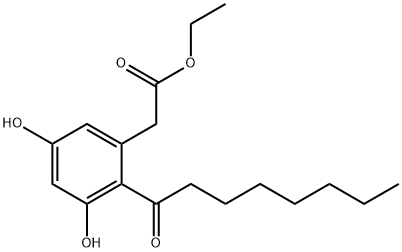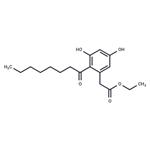Cytosporone B is a naturally occuring agonist for the nuclear receptor Nur77., induces the expression of Nur77-dependent genes including the gene for Nur77 itself. Induces apoptosis in cancer cells.
Cytosporone B has been used:
- as a positive control and NR4A1 agonist in NR4A1 reporter gene assay
- for Nr4a1 activation
- to treat OVX mice and study its effect on migration of osteoclast precursor
ChEBI: 2-[3,5-dihydroxy-2-(1-oxooctyl)phenyl]acetic acid ethyl ester is an aromatic ketone.
Cytosporone B (Csn-B) is the first naturally occurring agonist for nuclear orphan receptor Nur77. It binds with high affinity (IC50=0.278 nM) to the ligand-binding domain of Nur77 and stimulates Nur77-dependent activities. Nur77 is a nuclear receptor/transcription factor. A physiological ligand for Nur77 is as yet unknown, but there is increasing interest in Nur77 because of its known activities. Translocation of Nur77 from the nucleus to mitochondria initiates cell apoptosis, making it a potential target for cancer treatment. Nur77 is also involved in glucose homeostasis; it induces genes involved in gluconeogenesis. Csn-B physically binds to Nur77 and activates its transactivational activity and translocation to mitochondria to induce apoptosis. It inhibits cancer cell proliferation and tumor growth.

